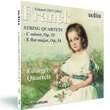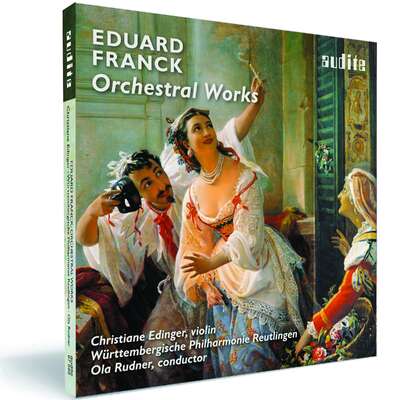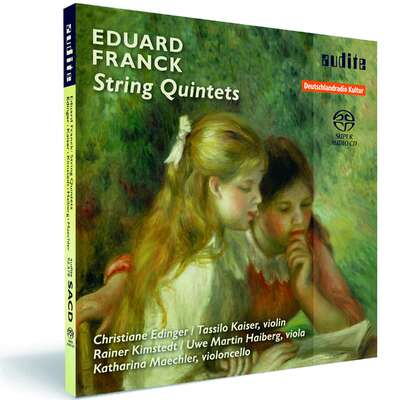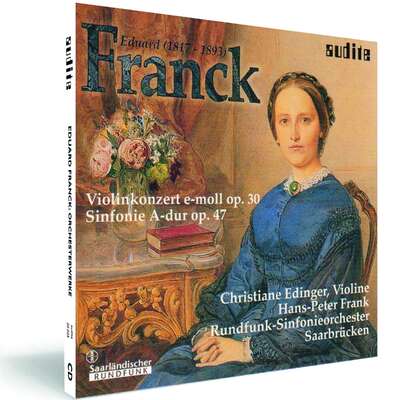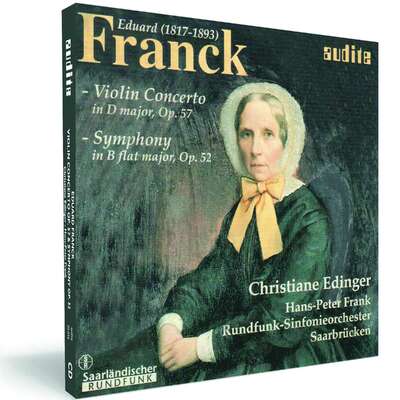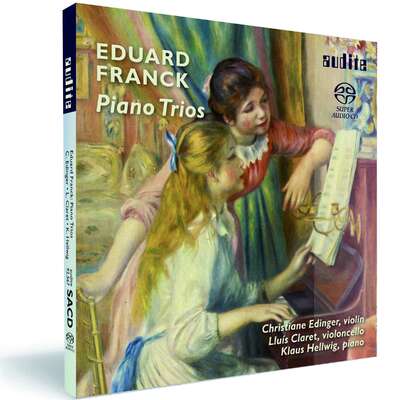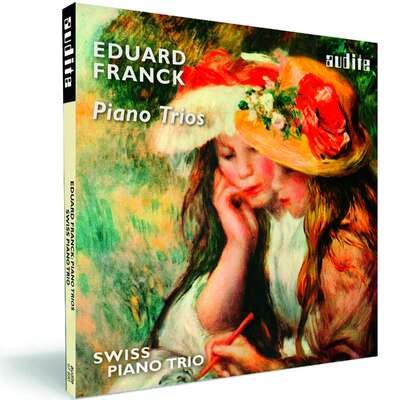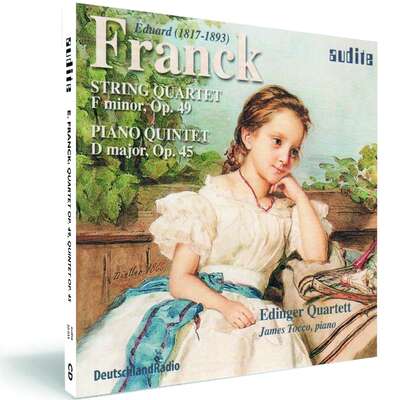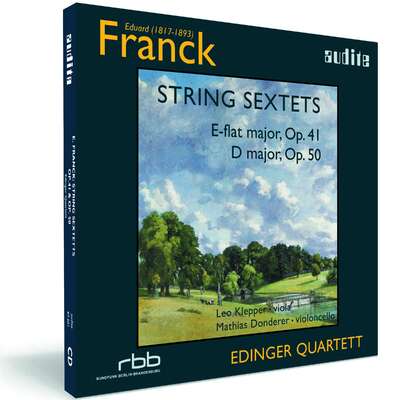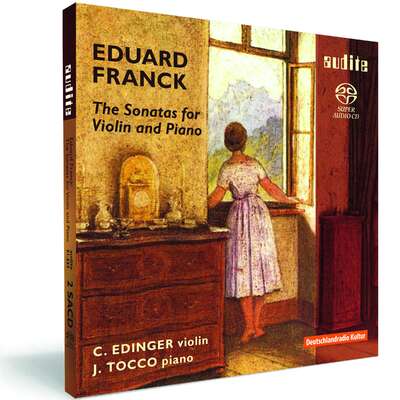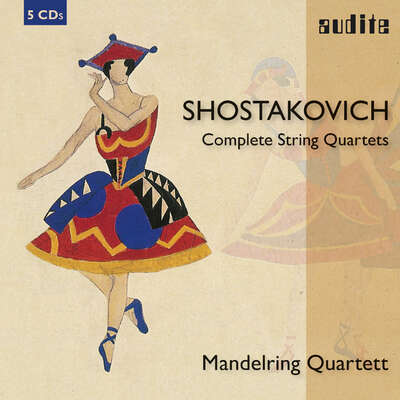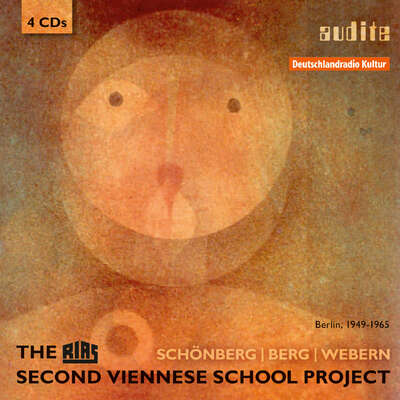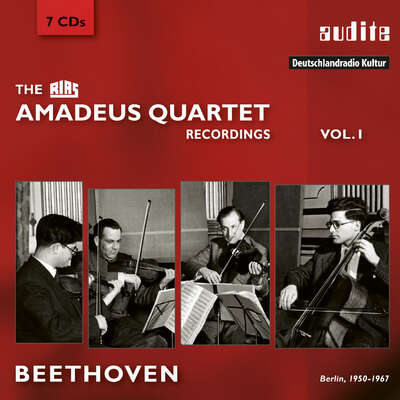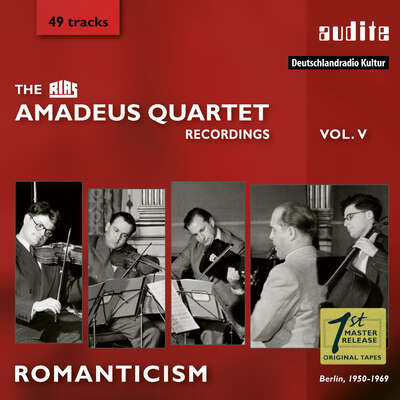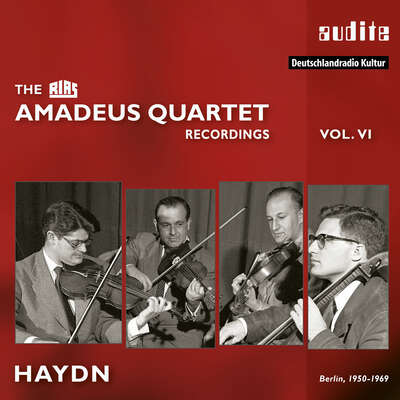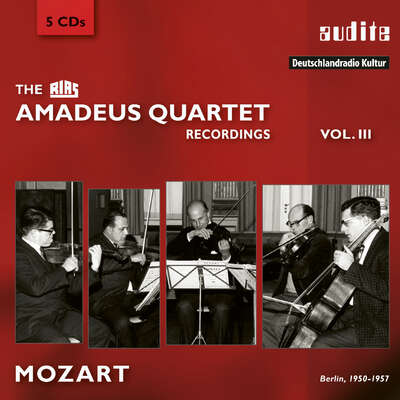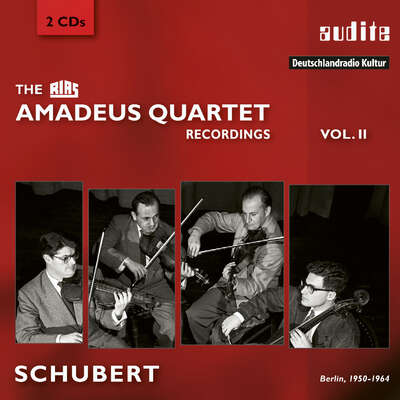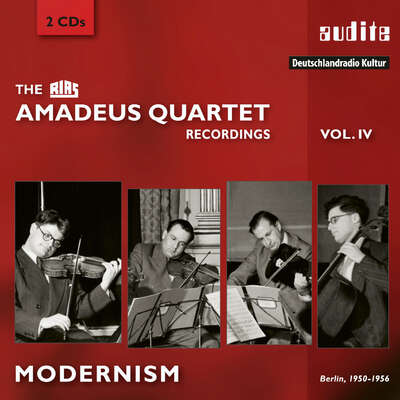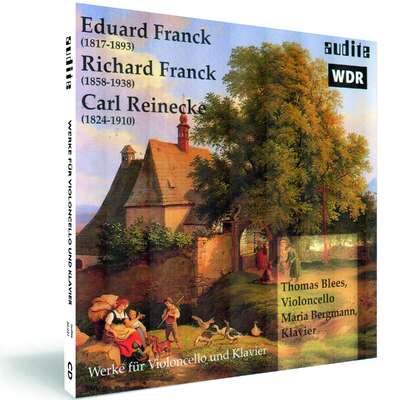
Audite continues its series of recordings of the works of Eduard Franck with a pair of principal works of his chamber music production. The two String Quartets deliver convincing proof of the Mendelssohn pupil's compositional mastery and count as exemplary in terms of realising the creative...more
"The Edinger Quartet's secure and enthusiastic playing communicates the love these players must feel for this music [...] Audite's warm, close recording puts you right in front of the players, making this disc a real treat for quartet lovers." (ClassicsToday.com)
Details
| Eduard Franck: String Quartets | |
| article number: | 20.032 |
|---|---|
| EAN barcode: | 4022143200327 |
| price group: | BCA |
| release date: | 1. January 2000 |
| total time: | 69 min. |
Informationen
Audite continues its series of recordings of the works of Eduard Franck with a pair of principal works of his chamber music production. The two String Quartets deliver convincing proof of the Mendelssohn pupil's compositional mastery and count as exemplary in terms of realising the creative possibilities of the genre around 1870.
The two Quartets, probably composed at about the same time, reveal a striking difference in character: the C minor Quartet, Op. 55 emphasises excited, dramatic gestures and attains great musical consistency, whereas the E-flat major Quartet is characterised by a far more differentiated stylistic variety - from reminiscences of Haydn to the dramatic "Adagio molto espressivo" of the second movement.
The Edinger Quartet attaches great value to the task of making little-known masterworks accessible to the public and has especially intensively dedicated itself to the chamber music of Eduard Franck.
Reviews
www.amazon.co.uk | 26 Jul 2009 | J. A. Peacock | July 26, 2009 Another fine issue in Audite's Eduard Franck edition
As I have noted in other reviews of Franck's chamber music, works in the minor keys do not figure prominently in his compositional oeuvre; thisMehr lesen
The C minor quartet, op 55, recorded here sounds a more Romantic strain than his F minor quartet had done - reviewed here, Franck E - String Quartet in F minor Op.49/Piano Quartet in D major Op.45 (Edinger Quartett). That earlier work seemed to strive for a more elevated mode of expression: its musical argument is constructed through motive work that was perhaps derived ultimately from Beethoven's quartets, albeit transmuted through Mendelssohn. The opening movement in the C minor quarter shares the same sense of driving rhythm that had dominated the finale of his quartet in F minor; in this piece, however, it is allied with more full-bloodedly melodic mode of expression. If there is still a `tragic' tone to this music, it is a personal rather than a universal one. The `allegretto' that follows offers a consolatory and contrastingly tender sound world, before the vigorous scherzo introduces some wildly dancing music; the finale is something of a tour-de-force in its energy and changes of mood. It certainly rounds off the work in style.
The quartet in E flat major is expansively conceived and opens with a touching, almost hymn-like `adagio molto' introduction; you might perhaps expect the main body of this sonata form movement to be somewhat mellow, but the `allegro' that follows is a high-spirited piece, rich in detail and displaying the composer's customary sure handling of form. The long `adagio molto espressivo' is an eloquent and touching piece - one of those movements of `heartfelt expression' I referred to in the opening paragraph. The scherzo and finale seem somewhat short compared to the earlier movements, both of which are individually longer than scherzo and finale combined. There is certainly no lack of energy or incident in them, though, with the last movement displaying an engaging and imaginative mastery of melodic variation.
This is another successful disc in Audite's ongoing series of recordings devoted to Eduard Franck. On the basis of the issues we have heard so far, long may Audite's advocacy of this fine composer continue. Highly recommended.
Diapason | Janvier 2005 | Jean-Claude Hulot | January 1, 2005
La firme Audite a entrepris de réhabiliter la musique d’Eduard Franck, romantique allemand qui fut l’élève particulier de Mendelssohn et quiMehr lesen
Les deux sonates pour violoncelle et piano sont de réelles réussites qui mettent en valeur le lyrisme flatteur de l’instrument, et qui mériteraient de revenir au répertoire ; l’éditeur leur associe celles de Richard Franck, fils d’Eduard et élève de Reinecke (lui-même successeur de Mendelssohn à Leipzig), également pianiste, compositeur et chef d’orchestre. Moins inspirées que celles de son père, elles n’en témoignent pas moins de la qualité « artisanale » du travail du fils Franck ; bonne idée d’avoir fait le lien par les Trois pièces, charmeuses et un peu salonnardes de Reinecke. Enfin, les deux trios avec piano de Richard sont également marqués par les influences de Mendelssohn, Schubert et Schumann, avec les mêmes écriture et invention mélodique que son père, quoique encore plus anachronique (1893 et 1900) ; les deux sonates pour violon et piano (1890 et 1903) sont tout autant charmeuses, illustrant avec bonheur la facture de cette « musique de salon » comme la baptisait avec condescendance Max Reger. Au demeurant, bien défendues par les musiciens réunis pour ces disques, ces pages inédites ne manquent pas d’attrait et justifient qu’on sorte des sentiers battus pour aller à leur rencontre.
Neue Musikzeitung | Juli/August 2004 | Hanspeter Krellmann | July 1, 2004 Schatten-Dasein – Komponisten, die aus dem Raster fallen
Unser musikgeschichtliches Verständnis orientiert sich an Eckdaten: SieMehr lesen
www.musicweb-international.com | 01.11.2003 | Rob Barnett | November 1, 2003
Here are two of the three surviving string quartets of Eduard Franck. All three have been recorded by Audite. Franck was a pupil of Mendelssohn whoMehr lesen
The C minor quartet (Op.55) has a pattering, purposeful and almost ruthless Allegro. It is startling and really catches the imagination. The Allegretto makes for a rest after such unrelenting activity offering ‘stillness and the night’ from another age. The vivace third movement has a Hungarian restlessness of mood. In the mercurial finale the moods melt and move but the music is nowhere near as dark as that of the first movement. The Op.54 Quartet starts with a reverent Adagio of the same mien as the Adagietto of the Op. 55 work. The Olympian calm continues into the powerfully sustained second movement (Adagio molto espressivo). After two Adagios come two Allegros in which quicksilver restlessness and contentment are the order of the day.
In common with the other three Audite Francks the detailed booklet notes are by Franck scholar, Michael Struck-Schloen. The excellent audio qualities of the recording add lustre to these world premiere recordings.
CD Compact | Num. 170, novembre 2003 | Josep Pascual | November 1, 2003
Hace pocos meses, empezó a distribuirse entre nosotros un compacto delMehr lesen
American Record Guide | 2/2002 | Carl Bauman | March 1, 2002
These recordings of Eduard Franck\'s (1817-93) string quartets are proudly labeled premiere recordings. I have no reason to disagree with thatMehr lesen
The Quartet in E-flat, Op. 54, was evidently written in Berlin in 1847; its companion, the Quartet in C minor, Op. 55, was not published until after his death, and its date of composition is uncertain. It appears first here and is an exceptionally fine quartet. The recording is ideal. Microphone placement is fairly close, yet the instruments sound in their individual places. This is important, because each instrument has a remarkable number of solos. He clearly was in full command of the quartet form, for the whole work is delectable. Themes are well and fully developed. Each of the four movements is well developed, and the quartet is unusual in that all four are marked allegro, allegro vivace, or allegretto. Both quartets are substantial, lasting 34 and 35 minutes.
The E-flat work begins with two adagio movements and concludes with two allegro movements. It is reminiscent of both the late Beethoven quartets and certain aspects of Haydn but with distinctly romantic influences as well. II is interesting for its similarities to great funeral music. Remarkable virtuoso turns are given to the first violin. III is a classically oriented minuet with a hunting trio. The finale is a series of variations.
Both quartets are well worth knowing, but Op. 55 is especially impressive. I would very much like to hear the other Franck works on at least five Audite releases, including two violin concertos and two symphonies as well as his Third Quartet and his piano quintet. Everything about this issue speaks of careful preparation and loving work.
Fanfare | Issue 25:3 (Jan/Feb 2002) | Martin Anderson | January 1, 2002
Eduard Franck was born in Breslau in 1817, studied with Mendelssohn in Leipzig between 1834 and 1838, moved from Berlin to Cologne, from there toMehr lesen
The music of these two quartets is confidently and expertly crafted—and just a tad anonymous at times. But Franck has a ready stream of melody into which he taps for some gorgeous tunes, and even if he doesn't readily establish a harmonic identity, he is always resourceful and inventive. The op. 54 quartet, probably the second of the three he produced, was written in 1847, when Brahms was 14—and again and again it's Brahms whom the music prefigures. Take the second subject of the first movement—who but Brahms could have written that melody? The same with the exquisite second movement, though here there's an admixture of Schubert, too. The lusty scherzo looks even further into the future: It directly pre-echoes the scherzo of Franz Schmidt's A-Major String Quartet of 1925. Michael Struck-Schloen's notes call on Beethoven and Haydn as influences on the E♭ Quartet, op. 55 (date unknown—it was published only in 1899): a slow introduction, in the late Beethoven's searching manner, and a concertante role for the first violin à la Haydn. The deeply expressive slow movement evokes Bach, both in manner and with a direct quote from the St. John Passion. This is something special: It brought tears to my ears when I first heard it. A buoyant minuet brushes such cares aside. And for the finale—11 variations on a monophonie song—he takes Beethoven's op. 74, the "Harp" Quartet, as his model, as Struck-Schloen points out. And now the pre-echoes are more surprising still: There are passages here that point forward to Robert Simpson's Ninth Quartet of 1982.
The Edinger Quartet performs both works with passion and commitment—not always perfectly in tune (the leader, Christiane Edinger, in particular), but not so far out that it mars your enjoyment. Good sound from Audite, and a helpful essay from Struck-Schloen.
This is, in fact, the sixth CD that the Detmold label Audite has dedicated to Eduard and Richard Franck. A cello sonata from each gentleman appears on Audite 20021, as does more music for cello and piano on 20.031 ; each of two Eduard Franck symphonies shares its disc with one of his violin concertos on 20.025 and 20.034; and his op. 49 String Quartet and Piano Quintet, op. 45, can be found on 20.033. I haven't had a chance to hear these discs yet, but you can be sure I am going to chase them down. In the meantime, this one is strongly recommended—here's another Franck you really ought to know.
Bayernkurier | Nr. 36 | Wolfgang Johannes Müller | September 6, 2001
NEUER ROMANTIKER
Ein Meister namens Eduard Franck
Über einen vergessenenen Komponisten noch so begeistert zu reden, istMehr lesen
Pizzicato | 09/2001 | Rémy Franck | September 1, 2001
Ein seltener Melodienreichtum prägt die beiden Streichquartette des Mendelssohn-Schülers Eduard Franck (1817-1893), die das Edinger-Quartett aufMehr lesen
Frankfurter Allgemeine Zeitung | 17.08.2001 | Werner M. Grimmel | August 17, 2001
Pflicht zur Romantik
Da ist Platz neben den Gipsbüsten: Eduard Franck hat ihn verdient
Daß er "auf diesem Wege weiter und vorwärts arbeiten" möge, wünschteMehr lesen
Klassik heute | 08/2001 | Peter T. Köster | August 1, 2001
Daß das Label audite mit der Wiederentdeckung des Mendelssohn-SchülersMehr lesen
Fono Forum | 7/2001 | M.S. | July 1, 2001 Vorhalte
In seinen beiden hier eingespielten Streichquartetten hat Eduard Franck (1817-1893) Einflüsse Beethovens und seines Lehrers Mendelssohn mitMehr lesen
www.ClassicsToday.com | 1/2000 | Victor Carr | January 1, 2000
The Edinger Quartet's secure and enthusiastic playing communicates the love these players must feel for this music [...] Audite's warm, close recording puts you right in front of the players, making this disc a real treat for quartet lovers.Mehr lesen
